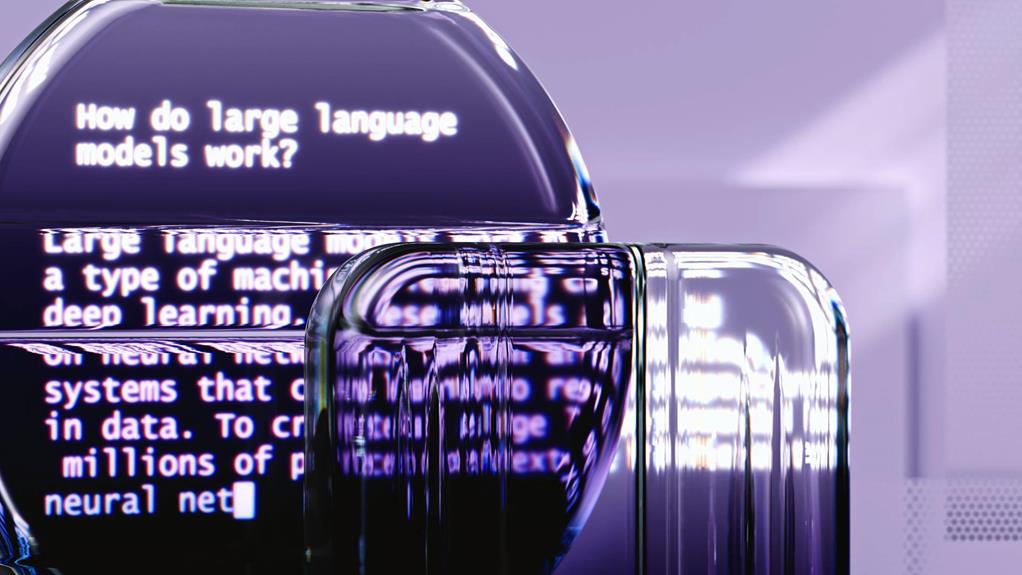As you consider the future of AI with ChatGPT, you'll notice its potential to reshape how we interact across various sectors. The evolution of these models promises not just improved conversations but also innovative applications that could redefine education, customer service, and more. However, the journey isn't just about technological advancements; ethical considerations will play a vital role in guiding this evolution. So, what challenges and opportunities lie ahead as we navigate this rapidly changing landscape?
Evolution of GPT Models
The evolution of GPT models has transformed the landscape of artificial intelligence in remarkable ways. You might not realize it, but these models have considerably changed how machines understand and generate human language. Initially, GPT models started as simple algorithms, but over time, they've grown more complex and powerful. You can see this progression from GPT-1 to GPT-3, where each version introduced improvements in language understanding, coherence, and creativity.
GPT-1 laid the groundwork with basic text generation capabilities. Then, GPT-2 expanded on this by using a much larger dataset, which allowed it to generate more coherent and contextually relevant text. By the time GPT-3 arrived, it became a game-changer. It could produce human-like text across various topics, making it useful for applications like chatbots, content creation, and more.
These advancements in GPT models aren't just technical achievements; they represent a shift in how we interact with technology. As you explore the capabilities of these models, you'll notice they're not just tools but also companions that can assist you in various tasks, making your interactions with AI more intuitive and efficient.
Transformative Applications of ChatGPT
As GPT models advanced, their applications began to reflect their newfound capabilities, and ChatGPT emerged as a standout example. This model has transformed various fields, demonstrating significant chatgpt advancements that enhance user interactions. In education, ChatGPT acts as a virtual tutor, helping students understand complex topics by providing clear explanations and answering questions in real-time.
In customer service, businesses leverage ChatGPT to handle inquiries, freeing human agents to tackle more complicated issues. This not only improves response times but also guarantees customers receive immediate assistance.
Furthermore, ChatGPT contributes to content creation. Writers use it to generate ideas, outlines, or even entire drafts, streamlining the creative process. This application not only supports individual creators but also aids organizations in producing engaging content quickly.
Additionally, ChatGPT's language translation capabilities have made communication more accessible across cultures. By breaking down language barriers, it fosters global collaboration and understanding.
These transformative applications showcase the versatility of ChatGPT, highlighting its potential to revolutionize how we learn, communicate, and create. As more industries adopt this technology, we can expect even greater innovations in the future.
Ethical Considerations in AI Development
Maneuvering the ethical landscape of AI development is fundamental for guaranteeing technology benefits society as a whole. As you explore the future of AI, you'll encounter various ethical issues. One significant concern is bias in AI algorithms. If developers don't address this, AI systems could perpetuate existing inequalities, affecting marginalized groups disproportionately. For example, facial recognition technology has shown higher error rates for people of color, raising questions about fairness.
Another important consideration is privacy. When AI systems analyze personal data, they could infringe on individuals' rights if not handled responsibly. You need to make sure that AI respects user consent and data protection laws.
Lastly, accountability is essential. If an AI system makes a mistake, who's responsible? Developers and organizations must establish clear guidelines to manage liability and transparency. This means creating systems that can explain their decisions, which is critical for building trust in AI.
Future Trends in AI Technology
Countless innovations are shaping the future of AI technology, promising to revolutionize how we interact with machines and each other. One major trend is the rise of natural language processing (NLP), which allows machines to understand and respond to human language more effectively. As you use AI tools, you'll notice improvements in their ability to understand context and nuance, making conversations feel more natural.
Another trend involves AI's integration with the Internet of Things (IoT). This connection enables smart devices to communicate and share data, leading to more efficient systems in homes and cities. You'll see how AI trends in IoT can optimize energy use, enhance security, and improve overall convenience.
Moreover, advancements in machine learning will continue to refine AI algorithms, making them more accurate and adaptable. This means AI can learn from new data and perform tasks with less human input. As you explore these emerging technologies, remember that ethical considerations remain essential. Understanding the implications of these ai trends will help you navigate a future where AI plays an even larger role in daily life.
Impact on Various Industries
Across various industries, the impact of AI, particularly tools like ChatGPT, is transforming how businesses operate and engage with customers. In the technology future, companies in sectors such as healthcare, finance, and education are increasingly adopting AI to streamline their processes. For instance, in healthcare, AI can assist in diagnosing diseases by analyzing patient data quickly and accurately. This not only saves time but also improves patient outcomes.
In finance, AI-driven chatbots like ChatGPT can handle customer inquiries, provide financial advice, and even detect fraudulent activities in real-time. This enhances customer service while reducing operational costs. In education, AI tools facilitate personalized learning experiences, adapting content to meet individual student needs.
Moreover, the retail industry benefits from AI through improved inventory management and targeted marketing strategies. By analyzing consumer behavior, businesses can predict trends and stock products accordingly.
Conclusion
In summary, the future of AI with ChatGPT looks promising as it continues to evolve. You'll likely see its applications expand across education, customer service, and more, enhancing daily life. However, it's vital to evaluate ethical implications to guarantee responsible use. Just like the invention of the wheel changed transportation forever, AI's advancements could reshape our interactions with technology. Staying informed and engaged will help you navigate this exciting journey into a new era of communication.

